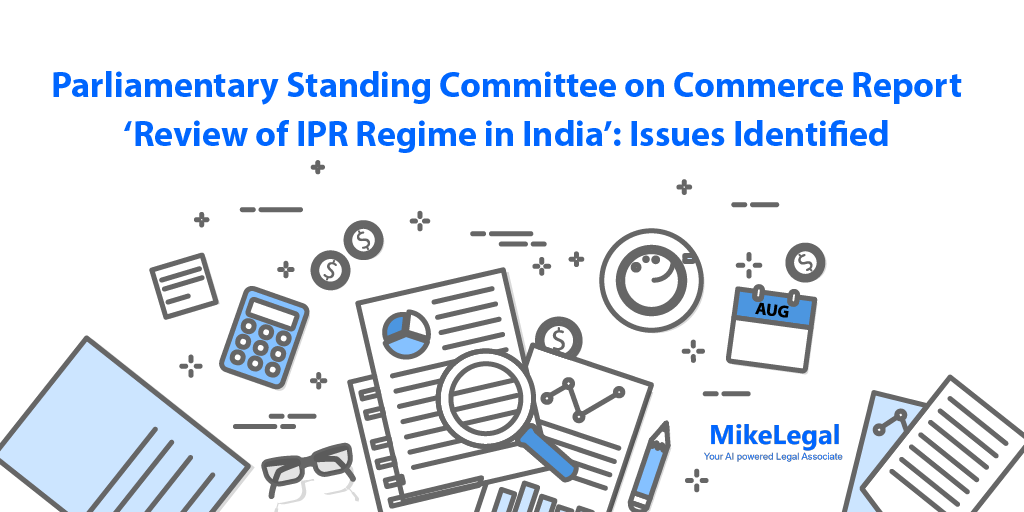Parliamentary Standing Committee on Commerce Report ‘Review of IPR Regime in India’: Issues Identified
On the 23rd of July 2021, the Parliamentary Standing Committee on Commerce tabled a report reviewing the Intellectual Property regime in India. The report suggested a complete turnaround and reform for IP policy in the country. The report is deemed controversial within academia and other industry-related circles due to several of the suggested reforms.
In the following passages, we will discuss the content of the report and the criticism it faces along with possible ideas which should have been considered by the committee.
Suggestions made in the Report
The report emphatically calls for reassessing Intellectual Property law and policies in India. It has recommended steps to boost IP financing through increased filings of copyrights and patents in the country. For this purpose, they highlighted the need to increase spending on Research and Development in various fields which in turn will increase the number of patent and copyright claims. It also mentions reforming respective Acts to make it easier to file and increase the scope of the provisions. The report mentions involving State Governments in the IP process to build a stronger policy framework.
One of the most important points in the report states the need for an institution at the top level that facilitates the economic and social climate required for the advancement of the IP regime in India. They also made a recommendation to reinstate the Intellectual Property Appellate Board which was abolished recently by an Ordinance passed in early 2021. There were suggestions to introduce a tier system of IPR centres to expand the reach of the regime to remote areas and IP dedicated funds to nurture a culture of intellectual property in the country. There was great emphasis on reforming the Patents Act along with a separate mechanism for stronger enforcement of GI tags, and yet another to protect Trade secrets.
Criticisms of the Report
The report was faced with severe criticism from the community as the approach is deemed to be pro-industry and has little inclusion of the interests of academic circles and other stakeholders. One of the major contentions that surfaced was that only corporate trade and law firms were consulted which goes on to a very capitalist stance. Another aspect that the report failed to include was the reason for extensive reforms that they are suggesting. Yes, the reforms may be needed but for what reasons?
There were several recommendations about specific IP areas like traditional knowledge, mathematical patterns, AI algorithms, etc. Now, these recommendations were probably made to gain a boost in IPR in India and encourage technological innovations by reforming the IP Acts. But, the Committee has failed to recognise that the countries in whose footsteps they are trying to follow to establish a strong IP regime in actuality had lax IP regimes which were not extensive and exhaustive to allow weaker enforcement. This was done purposefully to make space for mistakes as they encourage innovation. Such an approach permits creating an equitable environment for IP rights holders and the ones who use the said IP. But, the report follows an imbalanced approach to establishing a strong IP regime in India.
Even though the reforms in the Patent framework were suggested with fair intentions, the approach looks more into the big picture rather than the nuances that they should focus on. The report is idealistic yet it needs more focus on research and concrete propositions as to how to achieve a strong IP framework that is unique to India.
Conclusion
The report is fixated on the statutory aspect with no significant talk of actual changes and enforcement tactics. The Committee was unsuccessful in identifying that the atmosphere for novelty and innovation or a robust IP regime simply does not grow out of numbers and legal provision which was the primary focus in the report. The lacuna in it needs to be addressed with thorough on-the-ground research facilitated by extensive reading of existing literature in the matter and case studies from other countries as examples. The report may be considered a landmark by some but misses out on a lot because of its top-heavy nature.
References –
- Report 161
- https://spicyip.com/2021/07/a-parliamentary-standing-committee-report-that-challenges-the-fine-balances-within-the-ip-system.html
- https://spicyip.com/2021/08/parliamentary-standing-committee-report-on-ipr-tipping-the-scales-of-patent-law-part-i.html
- https://iprlawindia.org/report-161-review-of-the-intellectual-property-rights-regime-in-india-by-the-department-related-parliamentary-standing-committee-on-commerce/


